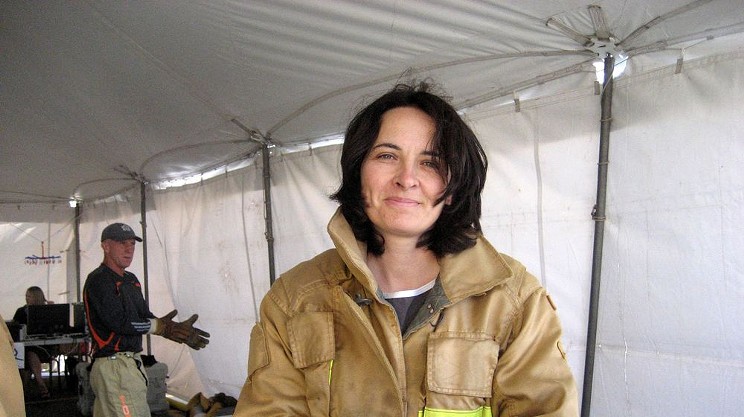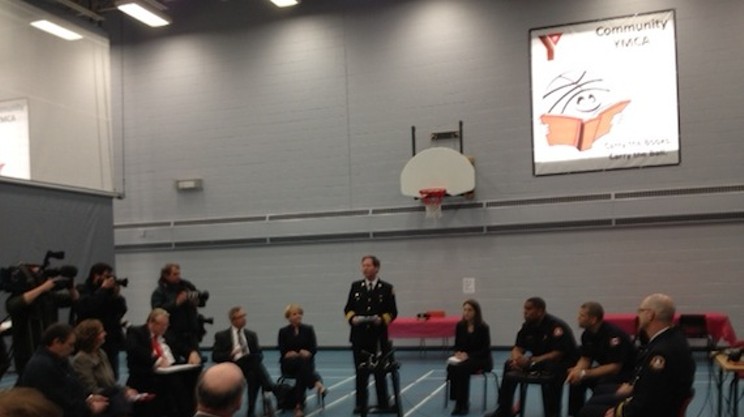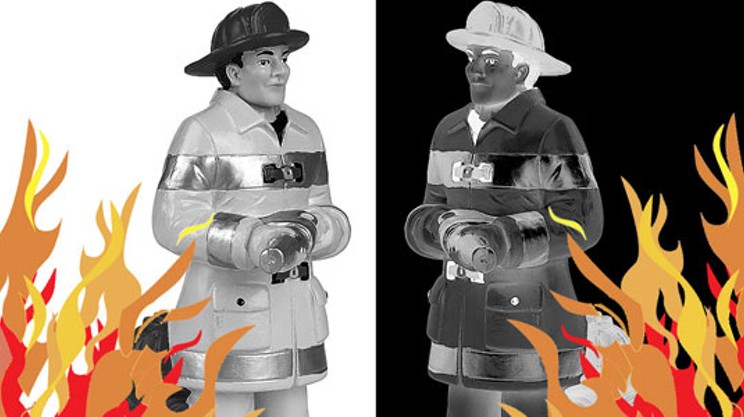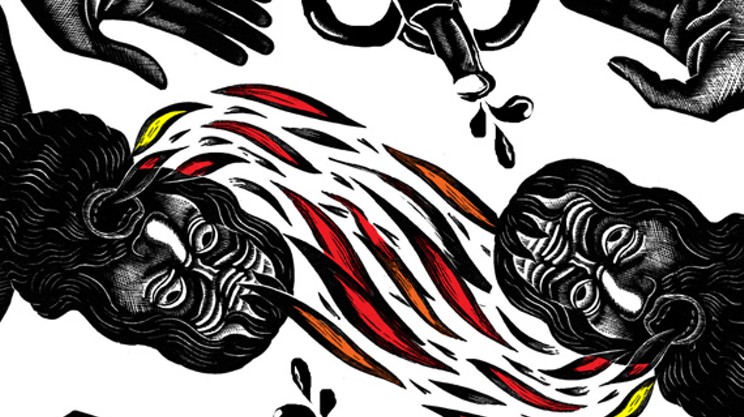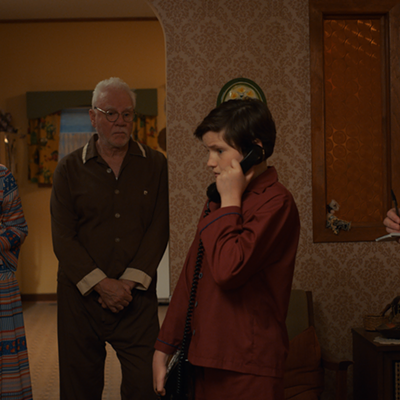When word leaked out this week that a group of black firefighters had filed a complaint against the Halifax fire department with the Human Rights Commission, fire chief Bill Mosher tried to frame the issue as an overreaction by two unduly sensitive employees.
"We had met with [black firefighters] and came up with an action plan," Mosher told the Chronicle-Herald. "But a couple on the group weren't happy with the progress we were making, so they decided to take their complaint to the rights commission... As any organization would have, you have differences of opinion. I have a difference of opinion with my family sometimes, but that doesn't mean you're a racist. Sometimes things are taken out of context."
But the black firefighters, who take collective action through a voting organization known as the Halifax Association of Black Fire Fighters, allege a workplace context of continuing racism over many years. The allegations, which are set forth in a series of documents provided to The Coast, include:
• repeated use of the "N" word among fire department personnel and, in one case, used to describe a black person involved in an accident responded to by firefighters;
• a firefighting training program where black recruits "were subjected to racism, unprofessional conduct and humiliation at the hands of fire school instructors";
• the assignment of a new black firefighter for on-the-job training to a fire captain who had previously been demoted in rank due to covering up racist behaviour;
• the distribution of a racist newsletter in fire stations throughout the HRM;
• a pay decrease for employees who had taken part in a special recruitment program for black firefighters, while white firefighters received a pay increase.
Of even greater concern than those specific incidents, say black firefighters, is a tepid and inconsequential response to the incidents on the part of fire department management. (Citing fear of reprisal from management, black firefighters interviewed for this article asked that their names not be used.)
Fire department management did investigate several of the allegations, but "These investigations have gone nowhere," reads the preamble to The Struggle for Acceptance: The Black Experience in Halifax Regional Fire & Emergency, a 15-page document with supporting evidence that was presented to the Human Rights Commission by the Halifax Association of Black Fire Fighters.
"The results [of the investigations] have not been published, there has not been any follow up and this leaves us with no closure," continues The Struggle. "As a result, we are left to question both the integrity and sincerity of these or any future investigations."
The Struggle was presented to the Human Rights Commission in 2007. Rather than start its own investigation, the commission offered to act as mediator between black firefighters and the city. The HABFF accepted the offer---"they told us we could go along and cooperate with HRM's investigation, that it would only show that the HABFF was trying all options to resolve issues," explains one black firefighter.
HRM in turn paid Maureen Shebib $40,000 to conduct an independent investigation of the allegations contained in The Struggle. Shebib is the former legal counsel to the Human Rights Commission and now the equity advisory at St. Francis Xavier University.
As black firefighters explain, they met with Shebib, who assured them her final report would be delivered to both the HABFF and the HRM at the same time. With that assurance, they cooperated with her investigation, providing lengthy interviews and detailed documentation of their allegations. On April 27, 2008, Shebib's report was provided to HRM, but only two weeks later was it delivered to the HABFF. Their copy of the Shebib Report was heavily censored, with many names omitted.
"I'm sorry, I'm not taking any questions on that," says Shebib over the phone from Antigonish. "Under no circumstances am I discussing that report." Pressed for details, she quickly hangs up.
"Once we got [Shebib's] findings, we decided as a group that this did not address our issues and provide the closure that our members needed, so we formalized our complaint with the HRC," says a HABFF member. That formal human rights complaint was filed on June 26, 2008.
The black experience
As the documents we obtained explain, black firefighters have always been a rare sight in HRM, and racist attitudes have been a feature of their employment from the start. Soon after amalgamation in 1996, explains a 2002 letter sent to a city councillor, a now-retired district chief told a white lieutenant that "I'm sorry for having to post you on a truck with two blacks." A year later, continues the letter, several firefighters were watching a boxing match on TV; "get the fucking [n-word]!" one yelled at the screen.
Many other similar incidents are detailed in the documents, but perhaps the most egregious---because it involves a civilian---occurred on March 23, 2002. As alleged in another letter, sent on July 14, 2002 to mayor Peter Kelly and then-CAO George McLellan, fire engine 14 responded to a traffic accident involving a black person. One white firefighter repeatedly referred to the civilian with the n-word, causing an argument between firefighters. All the while, claims the letter, the officer at the scene, captain Jim Benoit, laughed at the situation and refused to reprimand the man under his command who used the racial epithet.
Later that year, according to The Struggle, Benoit was involved in two other race-tinged complaints. Traditionally, because they are receiving extra pay, firefighters who are assigned to overtime are asked to buy pizza for the rest of the station crew. But as alleged in several documents, in two separate incidents when black firefighters Blair Cromwell and Jeff Paris were awarded overtime, the pizza request was changed to chicken. In context, say the documents, the incidents had racial overtones, with crew members and Benoit laughing while suggesting chicken for the meal.
Cromwell felt his complaints were going nowhere, and wrote the letter to mayor Peter Kelly and at least some councillors. (Some councillors contacted for this story say they never received that letter, and were unaware of the complaints in the fire department until a secret council meeting was scheduled this week to discuss it.)
After an investigation conducted by Dunphy & Associates, a local human resources consultant, then-fire chief Mike Eddy demoted Benoit. Eddy was later asked about the incidents during Maureen Shebib's investigation. As he explains it to The Coast, Eddy felt he was being railroaded by current fire department management.
Eddy describes Shebib saying, "You took action on this Jim Benoit thing---laughing at this comment---but only after it was coming out and people were hearing about it."
"Well," says Eddy, "I said [to Shebib], 'that's when I heard about it. You want to put me on a polygraph? Put me on a polygraph and I'll say the same answer.' When I heard about it I said, 'get that piece of shit out of here.'"
Benoit was given a one-year demotion, which was later shortened to 10 months, says Eddy. Shebib's report says that demotion was for the incident on the fire engine.
Benoit could not be reached for comment; a relative who answered the phone at his house said he is on vacation in Cuba.
Soon after these incidents, Eddy worked with the six black firefighters then on the force and the YMCA Enterprise Centre of Halifax to develop a recruitment program geared toward African-Nova Scotians. That effort resulted, in 2004, with the recruitment of 13 black men into a "designated class;" those men were given some financial assistance to attend the Nova Scotia Firefighters School in Waverley.
"That piece of it was my own thing," says Eddy. "Look, if this is going to work, let's just do it. So I told the HR people, bring in some of the community people, people from the black community---the people who would know what we need to do to be out there and say, look, these jobs are available, they are open---what the hell do we need to do to get out there and have a large number of people come forward?"
As Eddy explains it, the designated class was to be the first of three targeted recruitment drives, to be followed by efforts to recruit women and aboriginals. The recruitment program for women proceeded just after Eddy left the force in 2006, but the program for aboriginals never materialized.
Eddy bristles at suggestions the designated class somehow constituted reverse discrimination.
"Everybody that was on a list for HRM fire while I was there was hired," he says. "If you were white, blue, purple, grey, and you made it through our process---the bars were not raised more for one than for another, or lowered for one or another, they were the same---any person that was on a list got on the job---everyone. Not one person who made the grade was refused a job. I felt good about the fact that we never left white guys, if you will, sitting there, 'my god, I didn't get a job but all these black guys got hired.' We hired everybody."
That said, the new black recruits were promised one thing upon graduation: a posting to one of the coveted "core" fire stations on the peninsula or Dartmouth. These stations are considered a plum assignment by new recruits because they are busier and generally more interesting, but Eddy's reasoning was pragmatic.
"We brought them in as role models; we brought them in to show the black community that these jobs are not just white male jobs, that you can come in here," he says. "[To put them in a rural station] where there's only two people working twice a week in a fire station that only gets 25 calls a year, what kind of spinoff benefits am I getting in showing a community and a bunch of young people that these jobs are available? You're better off to advertise in downtown Halifax and downtown Dartmouth---areas where there are black communities---not in areas where there aren't any blacks that are impressionable. There's a reason for this---you never have to go out and do a special recruiting again. It perpetuates itself."
Fire school
While the recruitment of blacks was a success, the designated class faced problems even before its members graduated into department employees.
The Struggle and Shebib's report detail a number of problems involving the Fire School, which is a private institution but whose board of directors consists mainly of managers from public fire departments around the province.
According to Shebib's report, before the designated class started, HRM diversity coordinator Charla Williams and Donny Fairfax, with the YMCA Enterprise Centre of Halifax, were brought to the school for diversity training of school staff. They had asked for a three-day training period, but were given only half a day. Shebib reports that both Williams and Fairfax had "concerns about some of the staff. Fairfax stated that...'one person at the School was totally condescending and inappropriate.'" Williams' and Fairfax's concerns about the school were echoed to Shebib in interviews with HRM firefighters Nadya Pare and Kevin Reade, who are the department's diversity trainers.
According to The Struggle, the designated class experienced on-going racism. For example, when a group of black recruits entered the school an instructor commented loudly enough for them to hear, "There goes the neighbourbood." Another instructor told a dark-skinned Somali-Canadian student to "smile, I can't see you." The same instructor regularly referred to one black student as a "hooligan" and as "stupid."
On graduation day, says The Struggle, two black students were pulled aside and told they had failed one of the tests required of graduation; the students considered the late notice as a form of public humiliation.
But Shebib's report finds that the school's records, including test results, were inconsistent, contradicted each other, included impossible dates or were missing entirely---there was no clear record that the students did in fact fail the test. "Such records as do exist appear to contain a number of errors and may be completely unreliable," she writes.
The two "failed" students ultimately passed all the tests and now serve as firefighters in good standing.
In perhaps the strongest finding in Shebib's report, she recommends that the fire department "re-examine its training options and its relationship with the Fire School. We also recommend that [the Halifax fire department] re-examine its partnership with the Certification Board [which administers and grades the tests]."
Black firefighters acknowledge that the school is a private institution, but say because its management is so intertwined with public officials, and because the designated class was a program of the Halifax fire department, department management should have been more aware of the on-going problems at the school and should have extended more assistance to the students.
The Blaze
The black firefighters coming out of the school were given an offer of employment July 19, 2004, with a pay rate of $28,904 annually. That rate, said the offer, "was subject to change with implementation of the new collective agreement."
Indeed, just 11 weeks later, the rate did change: The new union contract saw total wages increase by 8.3 percent. But the new pay scales were heavily weighted in favour of veteran firefighters, at the expense of rookies; on October 2, 2004 the new rate for the designated class was $27,590, a decrease of about $50 in their bi-weekly paycheques.
"The decision to lower the base salary of new firefighters, employed after June 1, 2004, took place during the bargaining process by management and the union," notes Shebib. "It is not clear why, after the considerable effort expended on the Targeted Recruitment, this decision was made."
At the very least, says The Struggle, the upcoming new lower pay rate should have been spelled out in the offer of employment.
While the pay issue raised some distrust among black recruits, that distrust was matched by considerable ill will directed at them. The documents make passing reference to resentment of black students at the school, but after the students became official firefighters and were assigned to fire stations in the urban core, that resentment flowered into full-bloomed racism.
As related in The Struggle, one black student who had been singled out for ridicule at the school and who was told, on graduation day, that he had failed a required test was subsequently assigned to on-the-job training with captain Benoit, who according to Eddy had previously been disciplined for not taking action against the use of the n-word by a firefighter in his charge. The Struggle makes much of this firefighter being assigned to Benoit---the incident is the subject of an entire chapter---but Shebib ignores it in her report.
On December 11, 2005, the n-word was found scrawled across a poster in the washroom at Station 9 in Sackville, where two black firefighters were assigned.
Then, in January 2006 an online newsletter titled The Blaze was emailed to firefighters, and hard copies were left in HRM fire stations. The anonymously written newsletter was a cantankerous document that broadly attacked both department management and the union, as well as individual firefighters by name, and then proceeded to "welcome" new white recruits via an attack on the designated class of black firefighters. It read:
Congratulations men, and welcome to your new career. We hope you enjoy your new job choice in the Fire Service heaven. If you seem a bit bitter over your first station assignments, just remember, you are not members of a targeted recruitment and therefore there is no political reason for you to be visible. Targeted recruits cannot go to the outer regions because they certainly would not be very visible where you boys are going! Just shut up, be happy you got a damn job and, run your white little asses out there and be glad they are paying you. Don't expect any female company out there anytime soon either. They need to be visible too. Oh yea, make sure you pay your Union dues. Nuff said.
As The Struggle explains, black firefighters understandably regarded The Blaze as a vehicle designed to "incite hatred and contempt against black firefighters."
The union condemned the newsletter, and Eddy began an investigation, but at no point did he issue a statement of condemnation from department management. Much is made of this failure in Shebib's report: "When asked why [no management statement was issued], Deputy Chief Director Steve Thurber stated: 'I can't answer that. Mike was asked on more than one occasion... [but] nothing. I'm still mystified.'" For his part, the current fire chief, Bill Mosher, told Shebib that "it would have been Eddy's call."
But as Eddy tells it, his investigation into the incident bore fruit just as he was leaving his job in October, 2006. "Probably the week before I left the job, deputy Steve Thurber called me into his office to say we found out who the author was. I said, 'well, let's take action,' because this was not the first time this name came across the desk."
Eddy won't say how he knows, but says the newsletter was sent from an IP address that was traced back to Benoit's home address. Eddy says he wanted to fire Benoit then and there, but was stymied by HRM's legal department. Still, he subsequently gave that information to his successor, Mosher, who has likewise done nothing.
Regime change
Eddy says his retirement gave effective power in the department to Thurber.
"Bill Mosher might be chief, in the fact he wears the five stripes," says Eddy. "But many of the actions that are happening would be the intent and the way forward that Steve [Thurber] would want to see, based on my observation when I was there."
The two administrations point at each other as the cause of poor relations with black firefighters. Eddy blames Mosher and Thurber for not following through with The Blaze investigation and for abandoning the designated recruitment process. Although he refused to talk with The Coast, Mosher told other reporters "the issues that the black firefighters have filed with us are all issues that happened back when [Eddy] was the chief."
It's true that, as outlined in The Struggle, specific incidents of use of the n-word, the problems at the fire school, the distribution of the racist newsletter and other problems between individual white and black firefighters all occurred under Eddy's watch. And the documents show that throughout Eddy's administration black firefighters were repeatedly frustrated at the slow pace of investigations and their inconclusive results---it was eight months, for example, before Eddy says he learned the identity of The Blaze author.
But despite problems at the school and the subsequent poor reception given black recruits, Eddy is credited with greatly expanding the ranks of black firefighters---from six to 19---by creating the designated class program. Under Mosher's watch the targeted recruitment program has been scuttled, and just one additional black firefighter has joined the force.
Black firefighters interviewed for this article stress they generally have no problems with the white firefighters working beside them. Rather, their anger is directed at what they say is institutional indifference and the systematic failure of Mosher's administration to take their concerns seriously. Equally important, they say, is the abandonment of the designated recruitment program.
Rural postings
Documents collected with The Struggle, and verified in Shebib's report, detail Eddy's promises to the black recruits that they would be posted to core stations. That promise, however, was not reflected in the union contract, and after Eddy's departure, black firefighters were told they would now be posted to rural stations.
During the course of Shebib's investigation, however, Mosher abruptly changed that policy. "We were told on December 10, 2007 that the issue had been resolved and those hired under the targeted recruitment would not be going out of the core," writes Shebib.
"I heard they won the day on [rural posting], and that's good, because Steve Thurber lost one there, because I know that was his baby---trying to push all the black firefighters out to the rural areas," says Eddy. "That would've just---I wouldn't say undone---but it wouldn't have given us the advertising value that we are that fair and equitable employer. The kids in Uniacke Square and everywhere in Halifax where there are black populations and anywhere in Metro could say, 'you know what? I can have a job like that when I grow up.'" As of press time, Thurber did not return a call for comment.
The complaint
Under Mosher, say black firefighters, they've not achieved the kind of progress they had hoped to see.
By 2007, the firefighters' union was working closely with the HABFF, but was facing its own frustrations. According to a timeline sent to one councillor, a representative of chief Mosher told union officials on July 19, 2007, that Mosher would not meet with black firefighters because he considered them "a special interest group."
There has been some progress meeting HABFF concerns---the rural posting plan was aborted, and in March 2009 members of the designated class received a back payment for wages lost in 2004---but it has been too little, too late, say black firefighters.
"We don't want any money, we don't want any special privileges," says one black firefighter. "We want clear answers to our questions, and we want clear statements from management. That's all we've ever asked for, but they keep playing these games."
Additionally, The Struggle underscores the HABFF's disappointment with continuing recruitment efforts for new recruits, finding them inadequate and half-hearted.
"It's like somebody is trying to single them out and hurt them," says Eddy of black firefighters. "I can understand how the guys feel, because as I said to my wife, what do you think the motive is here---other than hurting people---just to sit back and have some kind of cock-eyed grin on your face and, 'ah, I got them'? That seems to me to be the only motivation one person could have."
Editor's note: The following was issued by The Coast on April 13, 2010.
APOLOGY
On April 2, 2009 The Coast posted an article on our website entitled "Black firefighters file human rights complaint." As with all of our stories, readers were invited to comment on the article. Unfortunately, several readers took this opportunity to write defamatory comments about Halifax Regional Municipality Fire Services Chief Bill Mosher and Deputy Chief Steve Thurber.
These comments were completely unsubstantiated and have harmed the reputations of Chief Mosher and Deputy Chief Thurber. The Coast sincerely apologizes to Chief Mosher and Deputy Chief Thurber for the damage to their reputations and the pain and suffering they have endured as a result of the defamatory comments which The Coast permitted to be posted on its website.
The postings have been removed from our website. As a consequence of the abuse of our comments policy, further comment posting in respect to this story will not be accepted.



